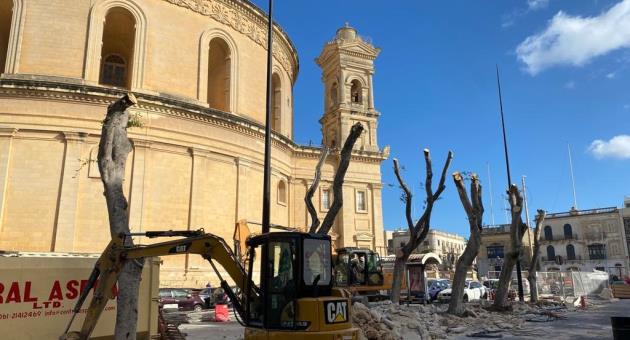
A dozen trees were stripped down in preparation for their relocation away from the car park on the side of the Mosta Rotunda.
Some people were angry because they were particularly attached to those trees. They spoke of the early morning bird song tickling the ears of people waiting for the pre-dawn buses before that particularly congested traffic node becomes too noisy to hear the earth move.
Some people were angry because they’re sad to see trees, any trees, face the fate of most of the little green left anywhere in this parched country. Maybe if the Mosta trees were the first to go they would have been quietly and briefly mourned like the trees of Fgura or the trees of Attard or the trees of Valletta lost over time. Over the last decades, some trees needed moving because they started harming property and infrastructure. Some trees needed moving because they threatened precious ancient heritage. Some trees needed moving to allow a better view of grand squares and palaces. Some trees needed moving because they were in the way. With time the small justifications of the small massacres amounted to nothing in the face of the great, nationwide loss.
Some people were angry because other people said they were angry. Because they hate feeling numb at all the devastation around them and any opportunity to express frustration is a good opportunity. They complained about the trees of Mosta, but their hearts wept at the jagged skyline of skyscrapers spouting all over like the emissions of wet nightmares. They wailed in empathic agony at the chopping of the limbs of those trees, but they were bleeding from the wounds of all the dug-up trenches on the roads, choking at the dust whisked up by the dry wind over open quarries, shivering in the shadow of soulless towers.
For some it was about the roaring machines chopping the trees of Mosta. For some it was about the roaring machines chopping trees. For some it was about roaring machines.
For all it was about a weird political system that seems unwilling or unable to represent their pain. The trees were not being chopped down by greedy capitalists. This massacre claimed to be in service of a Council project to “improve” the urban space intended to be enjoyed freely and openly by the community. The trees were no ancient noble forest or improvised mediaeval gallows dripping with the blood of history. They were soldiers holding the perimeter of the contemporary idea of public utility, the agora of our time, a flat tarmacked space criss-crossed with boxes of terminally fading paint. This was a car park.
The Local Council, made of neighbours of the people who heard the bird song while waiting for the bus before sunrise, unanimously decided to “relocate” the trees.
Until they unanimously decided to reverse their decision, congratulating themselves for “listening” to the residents. The prime minister publicly had just advised Councillors from his party to “listen” to the people, presumably certain they would not retort that doing that is not something anyone could reasonably expect from him. The leader of the opposition claimed the credit for the reversal saying it was a result of his party’s pressure, weirdly glossing over the fact that his party’s councillors supported the removal of the trees to begin with.
None of them acknowledged the time out of their lives taken by activists from Graffitti who resisted the removal of these trees like this was an intifada.
The trees are now saved. Maybe the branches will grow back, maybe the leaves will flourish again, maybe the birds will perch and sing to the morning light. But the barrenness of those stumps rudely stabbing the grey sky, squatting beside the Rotunda like the debris of a forest fire, will remind us of the barrenness of our politics.
I’d have respected a politician who defended an unpopular decision, who had stopped long enough to think about their power to relocate 12 trees and listed to themselves the reasons why they decided to exercise it. I’d have respected a mayor who took time to persuade his Councillors and led them through the objections they might have had the foresight to predict, even if I’d only heard their reasons after public outcry.
I’d have been impressed to learn there had been an internal discussion within parties, a system of taking messages up the chain from Councillors to local party office, to HQ. I’d have loved to see coherence in a political position, even a position I disagreed with.
Instead, I saw police officers handling Andre Callus in a way they would not handle someone they interrupt while robbing a bank.
And instead, I saw local politicians speaking from booming chests, their arms outstretched in a deluded fancy they are some Cicero announcing their climbdown like a triumph. Little they seemed to realise that their claim to national fame, such as it was, was how they bungled the puerile task of trimming the verge of a miniscule local park with more space for cars than anything that grows.
And I saw their political bosses sucked into a controversy they did not have the resources or the inclination to predict, pathetically chasing an angry crowd whose mood they failed to anticipate, to step in front of it and look as if they were leading it.
Welcome to the desert.